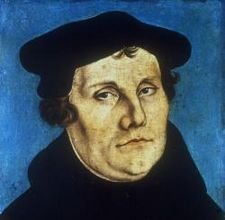Luther hailed as 'hinge' between Catholics and Protestants
 Pope Benedict XVI has praised Martin Luther, the most prominent figure of the Protestant Reformation, for having made "the question of God, the deep passion and driving force of his whole life's journey". Speaking on Friday in Erfurt, at the former priory where the young sixteenth-century reformer became an Augustinian monk and was ordained a Catholic priest, the Pope said he has always been impressed by the fact that Luther spent his entire life pondering how one received God's grace. "For who is actually concerned about this today – even among Christians?" the Pope mused at a private meeting with the top leaders of Germany's Lutheran Church.
Pope Benedict XVI has praised Martin Luther, the most prominent figure of the Protestant Reformation, for having made "the question of God, the deep passion and driving force of his whole life's journey". Speaking on Friday in Erfurt, at the former priory where the young sixteenth-century reformer became an Augustinian monk and was ordained a Catholic priest, the Pope said he has always been impressed by the fact that Luther spent his entire life pondering how one received God's grace. "For who is actually concerned about this today – even among Christians?" the Pope mused at a private meeting with the top leaders of Germany's Lutheran Church.
The president of the Church's council, Dr Nikolaus Scheider, said he saw Luther as "hinge" between Catholics and Lutherans because the belonged to both communities. "It is time to take real steps for reconciliation," he told the Pope. "I would like to invite you to do so, particularly in view of the upcoming anniversary of the Reformation in 2017," he said.
The private gathering was not broadcast (even to the press), but immediately afterwards the two delegations joined the already crowded adjoining church for an ecumenical prayer service. In his homily Pope Benedict admitted that there were expectations he would offer some sort of an "ecumenical gift" (he did not specify which). But he said that was a "political misreading of faith and ecumenism" as something that could be constructed like a bilateral treaty. "Faith is not something we work out intellectually or negotiate between us," he said. "Unity grows" he added, "only by entering ever more deeply into our faith in our thoughts and in our lives."
According to a text of the earlier private meeting Pope Benedict said Lutherans, Catholics and all mainline Christian confessions had to work more closely together to face two major challenges. He called the first the spread and "overriding missionary dynamism" of new forms of Christianity that have "little institutional depth, little rationality and even less dogmatic content, and ... little stability". And the second, he noted, was secularism.
- Francis and Ecumenical Patriarch Bartholomew I embraced one another
- Welby's way: How to avoid an Anglican schism
- United Witness to the gospel in our society.
- The true God is accessible to all
- What divides and unifies Chinese Christians?
- Assisi 2011: religions to renew their commitment to peace and justice
- An organization to empower believers to speak to the world
- Reformation is nothing to celebrate, says Cardinal Müller
- Has Pope Francis just opened a door for non-Catholics to receive communion?
- Gregorian crozier head at Anglican meeting- A once and future hope


 Votes : 0
Votes : 0









